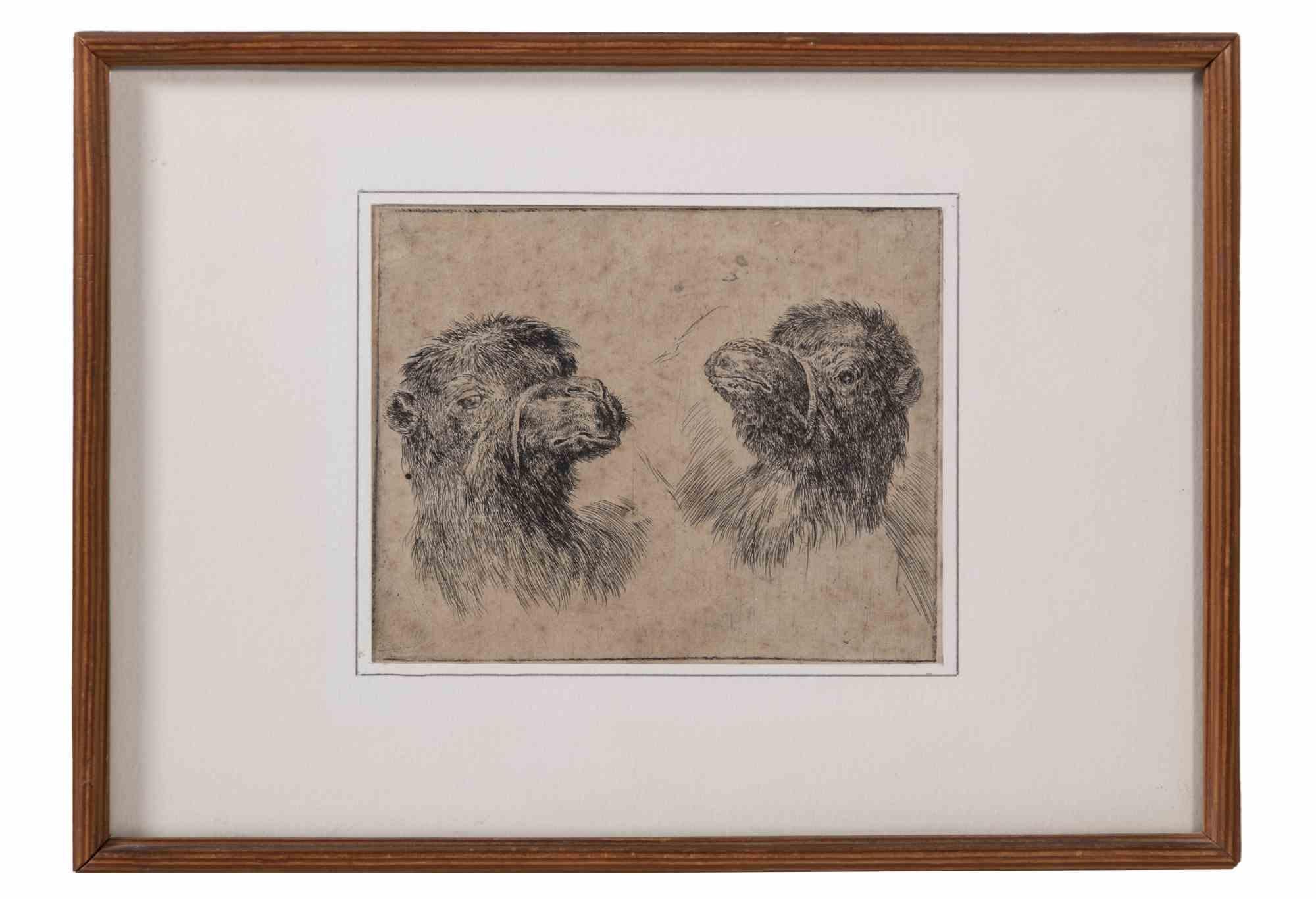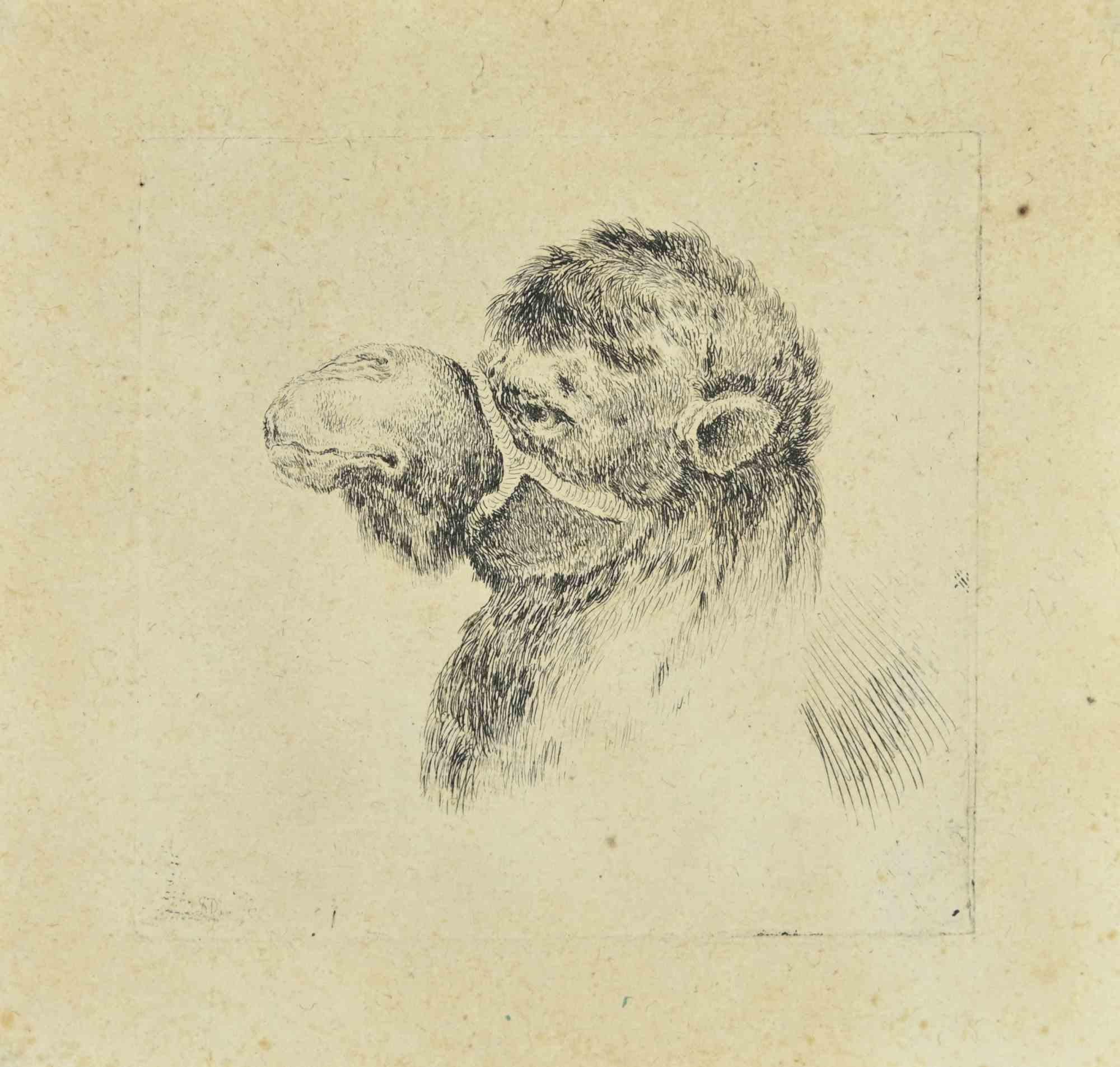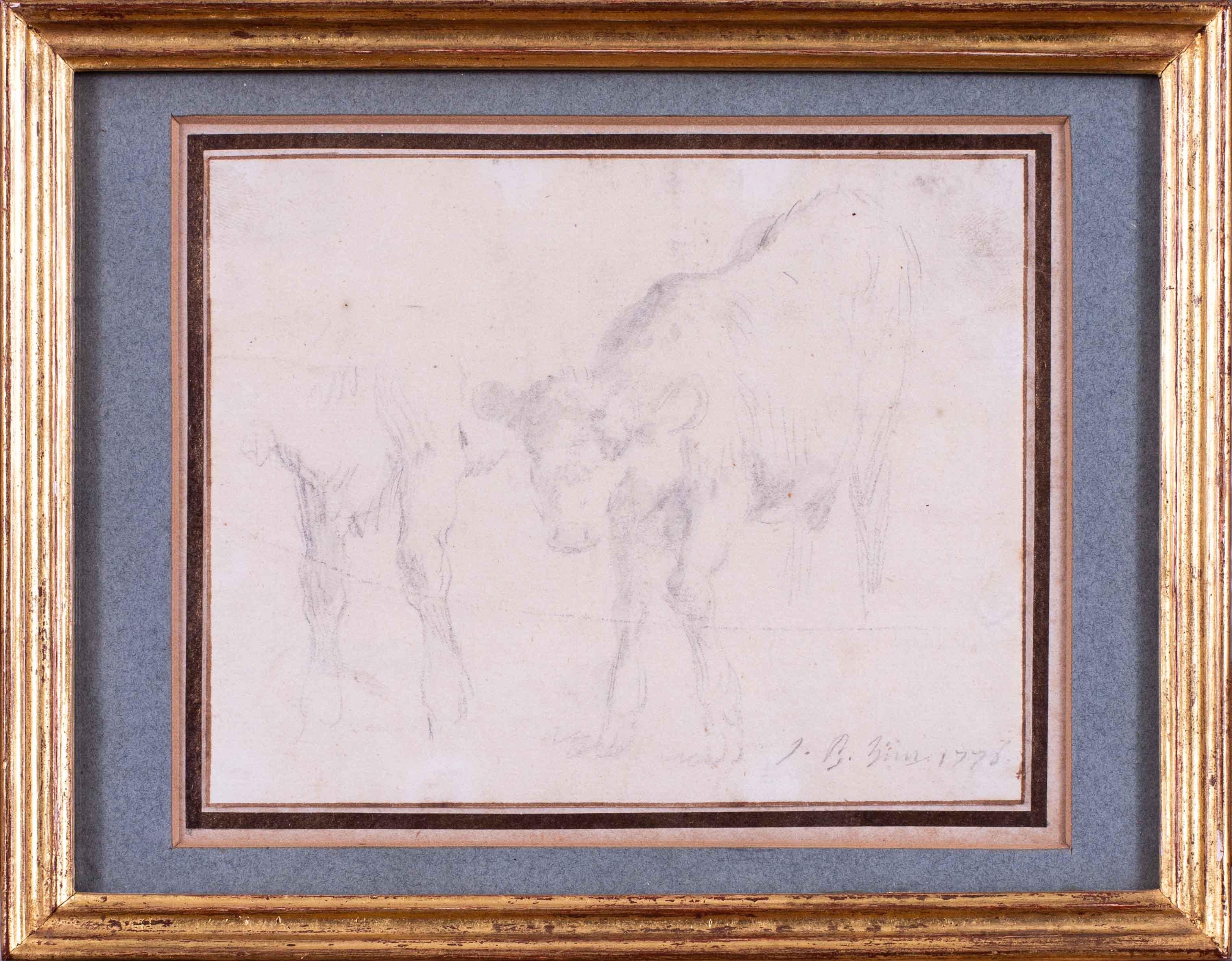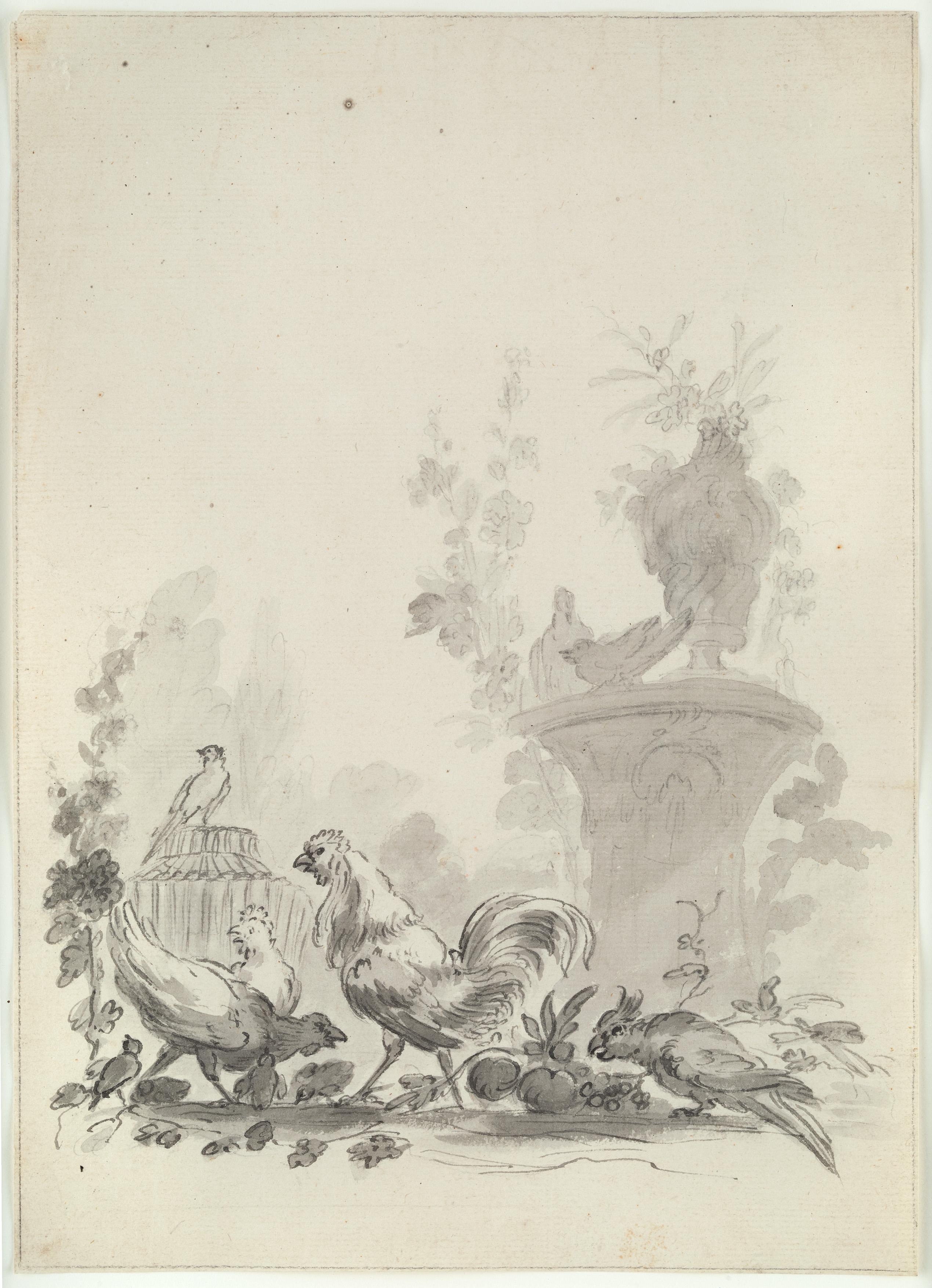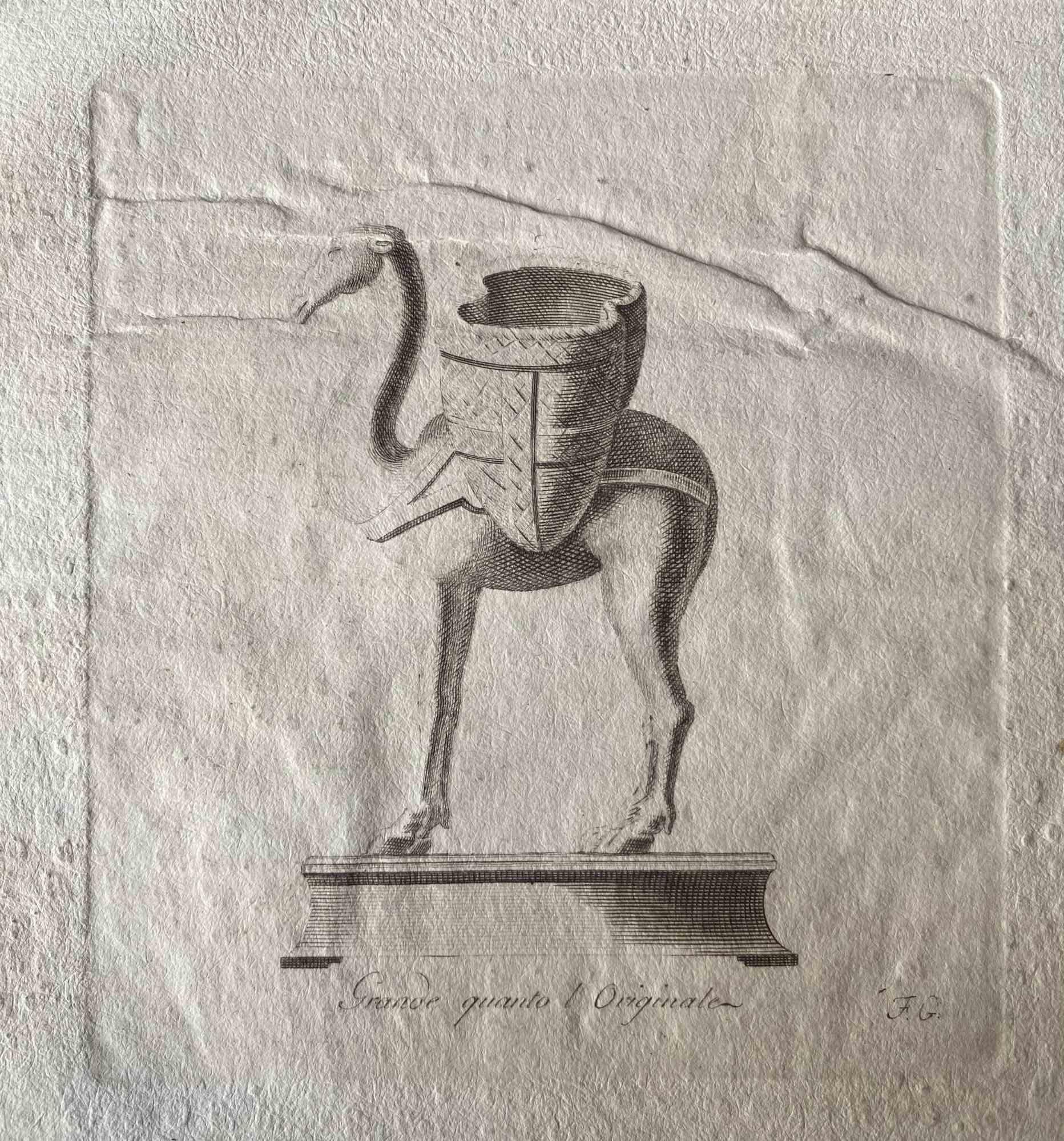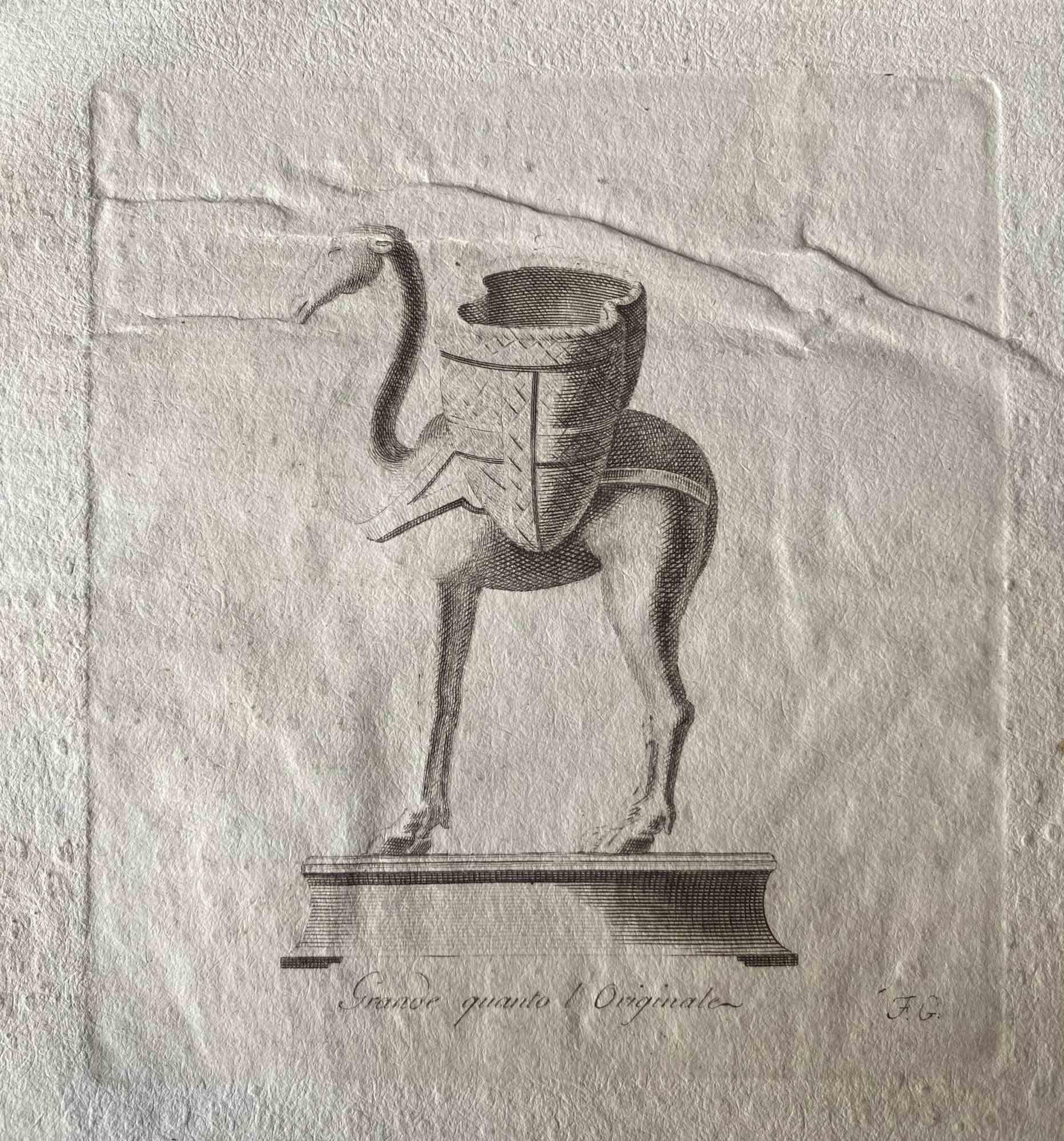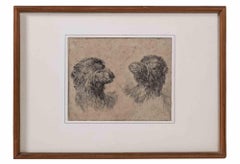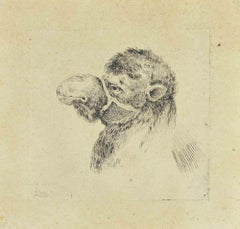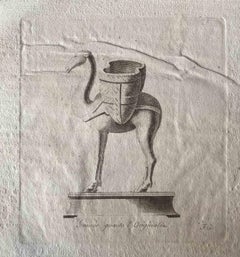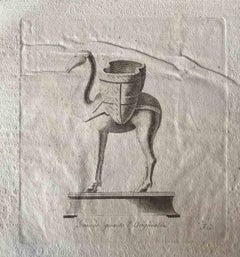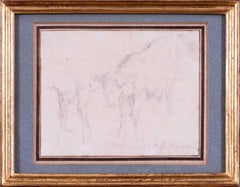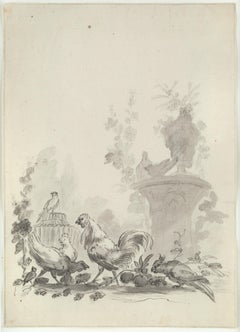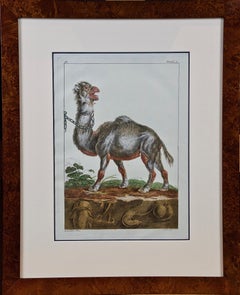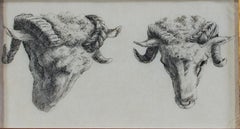Items Similar to Camel - Drawing by follower of Stefano Della Bella - 18th Century
Want more images or videos?
Request additional images or videos from the seller
1 of 2
Camel - Drawing by follower of Stefano Della Bella - 18th Century18th Century
18th Century
$1,435.28
£1,067.54
€1,200
CA$2,004.56
A$2,175.44
CHF 1,144.62
MX$26,431.62
NOK 14,330.45
SEK 13,493.42
DKK 9,139.06
About the Item
Camel is an artwork realized in the 18th Century by an artisti follower of Stefano della Bella.
Pencil Drawing.
The artwork is in good conditions .
The artwork is depicted skillfully through confident strokes with a dynamic composition.
- Creation Year:18th Century
- Dimensions:Height: 7.88 in (20 cm)Width: 7.88 in (20 cm)Depth: 0.08 in (2 mm)
- Medium:
- Movement & Style:
- After:Stefano Della Bella (1610 - 1664, Italian)
- Period:
- Framing:Framing Options Available
- Condition:Insurance may be requested by customers as additional service, contact us for more information.
- Gallery Location:Roma, IT
- Reference Number:Seller: T-1442181stDibs: LU650313553872
About the Seller
4.9
Platinum Seller
Premium sellers with a 4.7+ rating and 24-hour response times
1stDibs seller since 2017
7,728 sales on 1stDibs
Typical response time: 2 hours
- ShippingRetrieving quote...Shipping from: Monaco, Monaco
- Return Policy
Authenticity Guarantee
In the unlikely event there’s an issue with an item’s authenticity, contact us within 1 year for a full refund. DetailsMoney-Back Guarantee
If your item is not as described, is damaged in transit, or does not arrive, contact us within 7 days for a full refund. Details24-Hour Cancellation
You have a 24-hour grace period in which to reconsider your purchase, with no questions asked.Vetted Professional Sellers
Our world-class sellers must adhere to strict standards for service and quality, maintaining the integrity of our listings.Price-Match Guarantee
If you find that a seller listed the same item for a lower price elsewhere, we’ll match it.Trusted Global Delivery
Our best-in-class carrier network provides specialized shipping options worldwide, including custom delivery.More From This Seller
View AllCamel Study - Etching by Stefano Della Bella -1640s
By Stefano Della Bella
Located in Roma, IT
Camel Study is an original old master artwork realized by Stefano Della bella in 1640 ca.
Black and white etching. The plate is from the suite "Têtes de différents animaux".
Includ...
Category
1640s Old Masters Figurative Prints
Materials
Etching
Head of Camel - Etching by Stefano Della Bella - 17th Century
By Stefano Della Bella
Located in Roma, IT
The Archangel Raphael Leaving Tobias' Family is an etching by Rembrandt Camel head is an etching by Stefano Della Bella executed in 17th century.
Monogrammed “SDB fec.”
Plate 8,1x8,5...
Category
17th Century Old Masters Figurative Prints
Materials
Etching
Animal Figures - Original Etching by Various Old Masters - 1750s
Located in Roma, IT
Animal Figures from Ancient Rome, from the Series "The Antiquities of Herculaneum Exposed", is anoriginal etching from the end of the 18th century, made by Various Old Masters.
In v...
Category
Mid-18th Century Old Masters Figurative Prints
Materials
Etching
Animal Figures - Original Etching by Various Old Masters - 1750s
Located in Roma, IT
Animal Figures from Ancient Rome, from the Series "The Antiquities of Herculaneum Exposed", is anoriginal etching from the end of the 18th century, made by Various Old Masters.
In v...
Category
Mid-18th Century Modern Figurative Prints
Materials
Etching
Ancient Roman Fresco - Etching by Secondo De Angelis - 18th Century
Located in Roma, IT
Ancient Roman Fresco, from the series "Antiquities of Herculaneum", is an original etching on paper realized by Secondo De Angelis in the 18th century.
Signed on the plate on the lo...
Category
18th Century Old Masters Figurative Prints
Materials
Etching
The Buffalo - Etching by Antonio Tempesta - 1610s
By Antonio Tempesta
Located in Roma, IT
The Buffalo is a wonderful black and white etching on thick laid paper, realized by the Italian master Antonio Tempesta (1555-1630).
Not signed.
In excellent conditions.
Including a cream-colored cardboard passepartout, 34 x 50 cm.
An exciting original print, with all the dignity of a mythological or epic story, represented with an incredible balance of black and white, light and shadow, and a typical Baroque dynamism.
Antonio Tempesta, also known as Il Tempestino (Florence, 1555 - Rome, 1630), was an Italian painter and engraver of the early Baroque period. Antonio Tempesta trained in the culture of late Mannerism, with a naturalistic but also calligraphic taste, acquired from the frequentation of Giovanni Stradano, with whom he collaborated in the decoration of Palazzo Vecchio.
Moving to Rome in 1573, he worked for Pope Gregory XIII, frescoing some maps of Rome in the Vatican, including the famous Map of Rome (1593). In the pontifical capital, he worked for many noble families and for important cardinals, such as Alessandro Farnese and Scipione Borghese. His works are in San Giovanni dei Fiorentini, at the villa in Caprarola, in Tivoli.
He returned to Florence for a brief stay, where he collaborated with Alessandro Allori...
Category
Early 17th Century Figurative Prints
Materials
Etching
You May Also Like
18th Century Old Master pencil study of cows by French artist Jean Baptiste Huet
Located in Petworth, West Sussex
A rare and charming study of cows by 18th Century French painter, engraver and designer Jean-Baptiste Huet.
The details are:
Jean Baptiste Huet (French, 1745 – 1811)
Study of cows
P...
Category
18th Century Old Masters Animal Drawings and Watercolors
Materials
Pencil
Old Master Drawing, Roccoco, 18th Century, German Artist, Animal Drawing
By Johann Martin Metz
Located in Greven, DE
Black chalk, partly washed, on paper, sheet 27.5 x 19.7 cm
Plain gold moulding, 44.8 x 36 cm
The Rhenish still life painter Johann Martin Metz was ...
Category
18th Century Rococo Animal Drawings and Watercolors
Materials
Paper, Crayon
$765 Sale Price
20% Off
18th Century Hand Colored Engraving of a Camel from Pennant's " British Zoology"
Located in Alamo, CA
An 18th Century Hand Colored Engraving of a Camel from Thomas Pennant's famous publication on natural history "The British Zoology, Published under the Inspection of the Cymmrodorion...
Category
1760s Naturalistic Animal Prints
Materials
Engraving
17th century etching animal print sketch ram sheep black and white signed
By Karel Dujardin
Located in Milwaukee, WI
"Two Rams Looking Down & To Their Left" is an original etching by Karel DuJardin. DuJardin completed many delicate etchings of rams.
3 3/4" x 7 3/4" art
16 3/8" x 19 1/2" frame
Du Jardin was a master of various genres of painting, including refined and tranquil Italianising landscapes, monumental historical paintings and superb portraits of the aristocracy.
Unlike the majority of his contemporaries, Karel du Jardin (b. Amsterdam 1626, d. Venice 1678) was a talented painter in not one, but many different genres. He is especially famous for his small-scale landscapes, such as the charming Italian landscape with a woman milking a goa" (1652) from the Rijksmuseum's collection. Du Jardin depicted both sun-filled Italianate scenes and Dutch farmyards with pigs and sheep. He also painted a range of elegant portraits of aristocrats and merchants. His self-portrait (1662) on copper is one of the most fascinating 17th-century portraits of a Dutch artist. Du Jardin's spectacular large-scale historical pieces, represented is the show by the impressive Conversion of Saint Pau" (1662) from the collection of the National Gallery of London, are among his most remarkable achievements; he often chose themes that were only rarely depicted by other Dutch painters of the period.
During his own lifetime Du Jardin was praised by poets and writers, particularly for his attention to detail and elegant painting technique. As Cornelis de Bie, the artist’s biographer, wrote in 1661: "the surety of the brush at his finger and such sharpe clarity […] that the eye thereon doth linger." Du Jardin's valuable paintings were mainly purchased by rich individuals with an eye for elegance, but were also commissioned by prominent institutions such as the Amsterdam 'Spinhuis' (a women's prison), for whom he painted a vast group portrait of the prison-governors.
Karel du Jardin was an artist who liked to travel. He lived for a time in Lyon and in Paris, and sailed with Joan Reynst, Heer van Drakestein, by ship via England, Portugal and Spain to Tangier and Algiers, where they met Michiel de Ruyter...
Category
17th Century Old Masters Animal Prints
Materials
Etching
The King's Camelopard
Located in Amsterdam, NL
Charles Frederick de Brocktorff (1775–1850)
‘Camelopard – a present from the Pacha of Egypt to the King – at Malta on its way to England’
Signed and dated C.F. de Brocktorff. / 1827. lower right, inscribed as titled in the painted margins lower centre. Pencil and watercolour heightened with gold paint and gum arabic on paper, 36.8 x 27.9 cm
A gift so majestic, it made kings blush, and a gift so grand, it would startle Europe into a craze. Pasha Muhammad Ali of Egypt (1805-1848) did it in 1827: he sent to Europe three magical spotted, horned creatures, each with a neck reaching the skies and legs as long as a house is high. One giraffe to King Charles X of France, one to Francis I of Austria and the most fabled one to King George IV of England. A curious sight for Europeans, who had not seen such a beast since the Medici giraffe in 1487.
Few animals created more of a stir in Europe than these royal...
Category
1820s Naturalistic Animal Drawings and Watercolors
Materials
Gold
Italian neoclassical 19th century Italian figurative drawing antique frieze on paper
Located in Florence, IT
This drawing (pencil, ink and white lead on brown paper, 23 x 19, 5 cm) extremely accurately depicts an image taken from or inspired by antiquity, specifically an acanthus girale in ...
Category
19th Century Other Art Style Animal Drawings and Watercolors
Materials
Paper, Ink, Pencil, Chalk
More Ways To Browse
Camel Art
Old Master Pencil Drawing
Camel Painting
Pencil 18th
Camel Watercolor
Framed And Signed Watercolors
Antique French Watercolor Painting
Figurative Sketch
Boat Watercolors
Nude Drawing Framed
Watercolour Boat
Vintage Colored Pencils
Vintage Chinese Watercolor
Mid Century Pen And Ink
California Watercolor
Victorian Watercolours
Pen And Ink Drawings With Color
Watercolor Boats Painting
